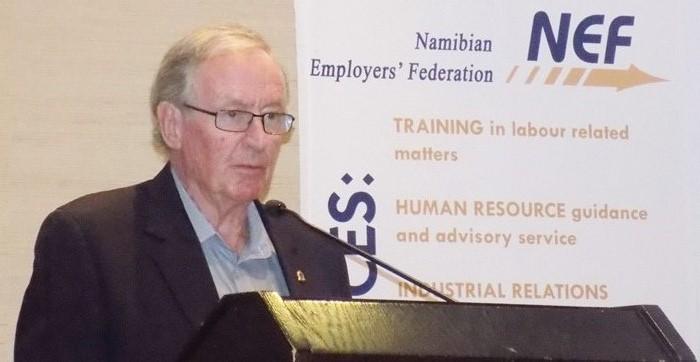
Legal action against NEEEF Bill

The secretary general of the Namibia Employers Federation (NEF), Mr Tim Parkhouse said this week the Federation has sought legal advice to prevent the implementation of the New Equitable Economic Empowerment Framework (NEEEF) Bill and urgs the government to withdraw the implementation of the bill.
Parkhouse said “The NEF represents in excess of 4,000 employers around the country from Katima Mulilo to Karasburg. Our submission to the Office of the Prime Minister with respect to the NEEEF Bill has been compiled from approximately 40 separate individual submissions from our members and input from 14 different Sectoral Associations. This [input] is not just thumb-suck!”
The secretary general further articulated that the enforcement of making 25% shares in a company available to the previously disadvantaged, is just not practical, affirming that buying shares is not just receiving annual dividends. “Who in Namibia has the means to be prepared to invest in a company that is going through difficult economic times? Will such shareholders be prepared or be able to financially support such a struggling company.”
The document submitted to the Office of the Prime Minister is inclusive of a legal opinion and a 17-page overview on the background and analysis of the bill with additional comments from NEF members. Sectoral Associations include The Hospitality Association of Namibia, The Manufacturers Association, and the Logistics Association to name a few of the numerous associations listed.
In the spread of legal and professional opinions on NEEEF, individuals such as Mr Willie du Toit, the chairperson of the Namibia Logistics Association (NLA) responded on the NEEEF policy document, enunciating “The NLA supports the ultimate goal of the NEEEF to assist to eradicate poverty and aim to securing prosperity and a life of human dignity for all Namibians.”
Du Toit added that their view however, is that it is senseless to only respond to the specific content on the draft Bill without referring to the Framework document on which the Bill is based. “We view the whole concept, as now presented, to be not well thought through, not researched properly and it requires to be debated on public forums for input from the very sector (business) that it intends to regulate.” he said.
In his analysis, Du Toit discussed the different pillars of the bill and criticized the government for resorting to “draconian” measures for non-compliance after 26 years of Independence. He further explained that the mandatory pillar of Management Control, and Employment Equity is impossible to implement in the short and medium term and can at best only be phased in over a long period as Namibia lacks trained and experienced, previously disadvantaged persons to be appointed for 50% of top management and board positions of private enterprises.
In the culminating moments of the press conference, when asked about what the NEF’s next move will be if government implements the bill, Parkhouse revealed that legal action is one of the main options they are looking into saying “our appeal to government is quite simple, don’t try to polish this bill, don’t try to adjust it, take it off the table and start again, but first hold detailed discussions with the private sector and unions and work out together how we can grow the national cake.”









































